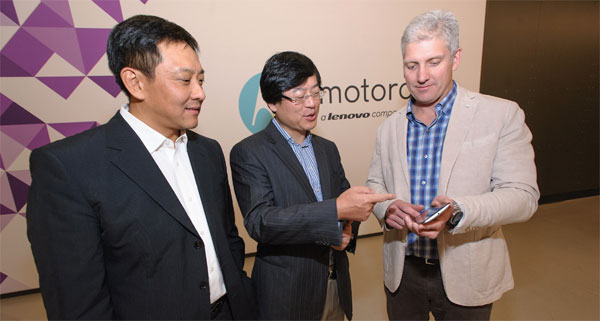Lenovo buys Motorola Mobility
$2.91 billion deal with Google should give a boost in China market
|
From left: Liu Jun, Lenovo Group Ltd's executive vice-president; Yang Yuanqing, Lenovo's chairman and CEO; and Rick Osterloh, president and COO of Motorola Mobility, look at the features of the new Nexus 6 smartphone on Thursday in Mountain View, California. Photo Provided to China Daily |
As the battle for global smartphone supremacy continues into the fourth quarter of 2014, the world's hottest mobile phone market just got hotter.
Lenovo Group Ltd's completion of a $2.91 billion deal to purchase the Motorola Mobility smartphone unit from Google Inc could help the Chinese high-tech firm enhance its position as a global smartphone provider, according to analysts.
"Lenovo has been on an absolute tear in making a number of acquisitions, so I think they have a very compelling approach with their hardware to service a number of customers," said Ramon Llamas, a research manager with the International Data Corp's (IDC) Mobile Phones Team.
"For Motorola, this is a new home and it's a strategic fit," he said.
Lenovo boosted global smartphone shipments by 38 percent in the third quarter to 16.9 million units, ranking it fourth worldwide, IDC data showed, with its market share expanding to 5.2 percent, from 4.7 percent a year earlier.
On Thursday, officials from Lenovo and Motorola met in California to announce the completion of the deal between the two companies.
As part of the pact, Lenovo will operate Motorola as a wholly-owned subsidiary and gain access to Motorola's portfolio of smartphones and patent rights.
Google will retain outright ownership of the patent portfolio, according to a Lenovo press release, but Motorola and Lenovo will have access to more than 2,000 patent assets as a result of the deal.
Yan Yuanqing, chairman and CEO of Lenovo, said the announcement of the completed deal was a "historic milestone" for both companies.
"We will give the market something it has needed: choice, competition and a new spark of innovation," Yang said in a company press release.
Jeff Meredith, vice-president of marketing for Lenovo's mobile business group, said Motorola's brand has value and equity that "needs to be reinvigorated" and that an e-commerce focus would be integral to the company's future sales plans in China.
The closing of the Lenovo-Motorola deal completes $5 billion in acquisitions announced in January, following the Oct 1 closing of Lenovo's $2.1 billion purchase of International Business Machines Corp. (IBM)'s low-end server unit.
Western market prowess brought to the table by Motorola pairs well with Lenovo's on-the-ground engineering capabilities, said Frank Gillett, an analyst with Forrester Research.
"Lenovo will be challenged by other domestic Chinese firms but the competition is so tough to gain ground among the Android phone suppliers, especially since so many customers are at least somewhat price conscious," Gillett wrote in an e-mail.
"It will be difficult for Lenovo to gain significant share in this market," he wrote. "At the end of the day this can't just be a competition about price, [it] has to be a competition about differentiated hardware and software experiences. I think Lenovo was well prepared despite the challenges that Motorola faces."
Other players, including Apple, Samsung and domestic Chinese leader Xiaomi, have ratcheted up the pressure on Beijing-based Lenovo, according to data from IDC.
Xiaomi, a smartphone company founded in 2010, passed Lenovo into third place in global smartphone rankings. Xiaomi shipped 17.3 million devices in the third quarter of this year, taking 5.3 percent of the world market in the process.
The majority of Xiaomi and Lenovo's devices typically sell for prices between $100 and $300, while Samsung's high-end Galaxy smartphones cost around $500.
Samsung, based in Suwon, South Korea, remained the world's largest smartphone vendor, with 23.8 percent (78.1 million devices), followed by Apple with 12 percent (39.3 million).
Motorola wasn't among the top five vendors in IDC's ranking. It had operating losses of more than $1 billion last year, data from Bloomberg News showed.
"People just don't appreciate how challenging the smartphone and tablet business is," said Scott Kessler, an analyst with S & P Capital IQ. "Sure, Google has had forays into hardware. But being in this business as a principal provider of smartphones and tablets is a very challenging undertaking, one that's really different from what Google has historically focused on."
Llamas said, "Now that we have a company with a much greater alignment in place, Lenovo and Motorola are going to have to work that much harder," he said. "Both Lenovo and Motorola have been courting the low-end of the market, so the question is how far down Lenovo is willing to go. But it's not just about price; it's about bringing value to the right price point for customers."

























